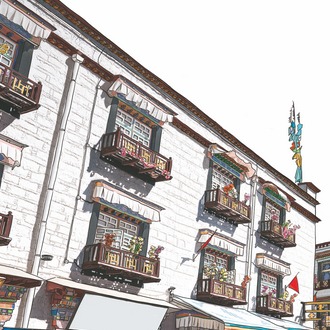



Step off Barkhor Bazaar and into the narrow surrounding alleyways and you soon feel as if you are entering another world, away from the hustle and bustle beyond.
Silence is restored upon entering one of the old courtyards and closing its doors, where you are let into the home of Penba, a female group leader of the courtyard, designated by the community, and her secret back garden.
Having lived here since she was a child, the 61-year-old sometimes begins her day by getting up at 6 am to sweep the courtyard and clean the shared toilet on the second floor of the two-story structure. As she goes about her routine, she records it on her mobile phone and later uploads the short video to a group chat on WeChat.
The members are all courtyard residents from some 18 households, who take it in turns to do the morning cleaning, and prove they've done their job via short videos.
She says it is necessary for everyone to obey the rules and ensure the public environment is welcoming to all.
Penba lives with her husband, daughter and two school-age grandchildren in the house on the first floor where she grew up. The family of five shares a home about 36 square meters in size.
She tries to keep the inside and outside of her home clean and cozy.
"I hope every member of the courtyard also feels the same," she says.
This is why she always encourages her neighbors to clean thoroughly and on time, and why every household grows potted flowers to make the old courtyard lively.
The courtyard is home to 45 inhabitants including her family, according to the notice on the wall at the entrance of the courtyard that displays details of the courtyard.
Next to the notice is an emergency box containing medicines for different ailments.
The courtyard has undergone several transformations. Penba says the earliest she can remember took place between 1995 and 1996.
"The structure was reinforced while the original Tibetan style was retained. The ground was repaved so that when it rains, there isn't dirt everywhere and rooms aren't flooded." Water pipes have also been installed and now residents enjoy the convenience of fetching water from a pump in the courtyard.
According to Xu Meng, an urban planner at the China Academy of Urban Planning and Design, since the peaceful liberation of Xizang in 1951 the historical architecture of Barkhor Bazaar and its neighboring alleys and courtyards, known as the Old City of Barkhor, have been renovated, making daily life for people living in the area more comfortable in the process.
"The renovations have been carried on in several stages," he says. "First the protection of certain historical buildings, then the conservation of the layout of the streets and the Old City, and in recent years the improvements to the infrastructure."

Ngakon, secretary of Party working committee of the management committee of the Old City of Barkhor, says the government views the protection of the historical area and improving the conditions of local communities as a priority, and an annual budget of about 20 million yuan ($3 million) has been invested to fulfill that commitment.
He says that over the years, drainage systems and streetlamps have been added, and the roads are repaved, so that residents feel their living environment improving every year, making them happier.
Among those benefiting from the improvements are Ratna Kumar, the 68-year-old Nepali owner of the Syamukapu Nepali Shop, which sells Buddhist statues. He and his family live above their shop.
Ratna Kumar came to Lhasa in the early 1980s to manage the shop, which his family opened some 140 years ago, and since then, he has settled in the city. He has witnessed living conditions on Barkhor Bazaar change greatly over time.
"Back then (in the 1980s) there were very few cars. Electricity came on at a regular time in the evening, but there was no running water."
He says the situation has been better since the 1990s, and the whole area looks clean and well-organized, so that both tourists and residents have comfortable experiences.
Xu says the renovations are designed to protect and preserve local culture. Tourists are able to feel the vigor of Barkhor Bazaar and the old town of Lhasa, and meanwhile, residents continue to enjoy the convenience of getting the services they need on a daily basis, for example, stores and hospitals are just meters from where they live.
Zhang Kemeng, a frequent traveler from the Ningxia Hui autonomous region, says he has been to almost all the famous tourist destinations across the country, and the uniqueness of Barkhor Bazaar is that it combines folk tradition, ethnic culture and religion, as well as enough commercial offerings to meet the needs of tourists.
"Quite frankly, I'm not against commercialization — the gift shops, studios doing makeup and photo services, must-visit restaurants and other daka (social media check-in) sites — as long as they don't disturb local residents. Some of these small businesses are either run by, or employ, people living along the street. It is part of their livelihood.
"There are many benches on Barkhor Bazaar. Pilgrims and residents share the benches with visitors like me, and when I did, I sensed harmony," he adds.
Penba says she has never thought about leaving the courtyard of Barkhor Bazaar for an apartment building.
"I belong here," she says.
Palden Nyima and Yang Lurong contributed to this story.
If you have any problems with this article, please contact us at app@chinadaily.com.cn and we'll immediately get back to you.